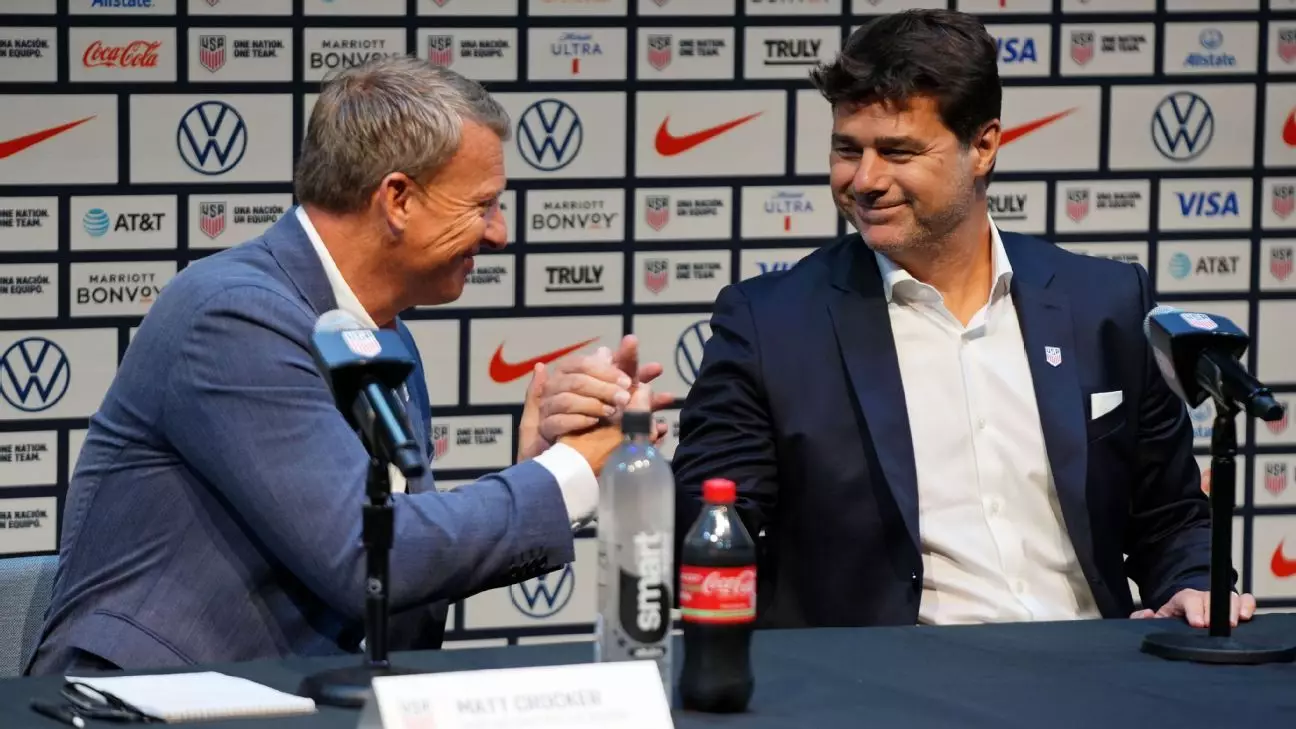Mauricio Pochettino’s appointment as the head coach of the United States men’s national soccer team marks a turning point in American soccer. With a clear-eyed vision, Pochettino emphasized the need for the men’s team to establish ambitions similar to those of their female counterparts, who boast an impressive record including four World Cup titles and five Olympic gold medals. During his introductory press conference, he expressed a firm desire for the team to believe in their potential to win the World Cup, urging players to draw inspiration from the successes of female athletes.
His familiar yet resolute eloquence encapsulates a transformative philosophy—one rooted in aspiration and dedication. Pochettino’s approach signals a departure from mere participation in international tournaments; it embodies a commitment to excellence. The men’s team has struggled historically, not having reached the quarterfinals since the 2002 World Cup, yet Pochettino’s belief in the importance of cultivating a winning mentality could shape a new era where players prioritize victory.
Pochettino, an Argentine national with extensive coaching experience that spans several prominent European clubs, steps into this role with fresh eyes and forward-thinking strategies. Becoming the first foreign-born coach of the U.S. team since Jürgen Klinsmann, Pochettino brings with him a wealth of experience, including stints at Southampton, Tottenham Hotspur, and Paris Saint-Germain. His track record speaks volumes, with accolades that reflect both tactical prowess and the ability to nurture young talent.
However, this undertaking is not without its obstacles. The U.S. men’s soccer landscape is evolving, but success has remained elusive. The recent firing of Gregg Berhalter following the team’s early exit from Copa América serves as a reminder of the industry’s high-stakes environment and the expectations from fans and stakeholders alike. Pochettino, therefore, is not only expected to field competitive teams but also to foster the camaraderie and discipline essential for success on the international stage.
Collaboration seemed pivotal in Pochettino’s recruitment as he was endorsed by Emma Hayes, who notably shifted from her role at Chelsea FC to coach the women’s national team. Hayes’ vocal support underscores the interconnectedness of the U.S. soccer community, highlighting a promising culture of cooperation which can provide Pochettino with a support system as he transitions into this new chapter.
With U.S. Soccer Federation officials, including president Cindy Parlow Cone, acknowledging the potential within the current player pool, Pochettino must navigate the complex pressures of performance while cultivating team dynamics. The players, who some claim are the most talented generation yet, require guidance not just in skill development but in learning to function as a united front on the pitch. This collective mentality will be crucial as Pochettino embarks on his journey with the national squad.
With the 2026 World Cup set to kick off in Inglewood, California, Pochettino has a limited window—637 days—to prepare his team. His immediate focus includes friendly matches against Panama and Mexico and competitive fixtures in the Concacaf Nations League. These early games will serve as critical indicators of his coaching philosophy and strategic implementation.
In a sport known for its unpredictability, Pochettino’s initial plans may be disrupted by player availability and the current lack of depth—especially in key positions like goalkeeper and central defense. The challenge will be further compounded by the pressing need for on-field discipline, an area that has historically plagued the U.S. men’s team.
Mauricio Pochettino’s entry into the U.S. men’s national soccer team coaching scene represents not just the appointment of a new leader but the initiation of a broader narrative of transformation within American soccer. Aiming to align with the high benchmarks set by the women’s team, Pochettino’s journey is one laden with ambition, responsibility, and the hope of rejuvenating a storied program. As he sets out to instill a winning culture, the broader soccer community will watch closely—hoping for success that transcends mere victories, fostering a legacy that makes history on the global stage.

Leave a Reply